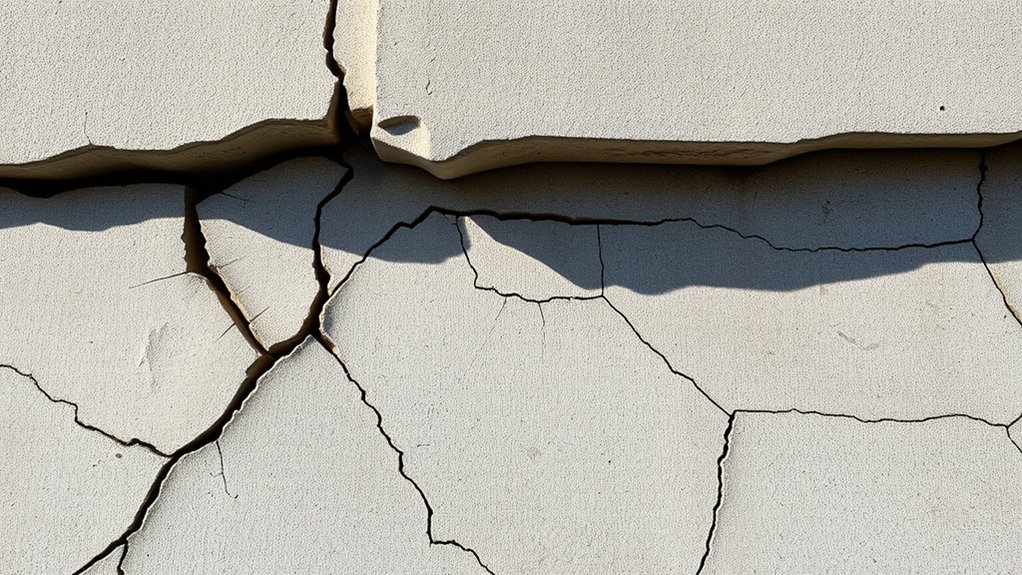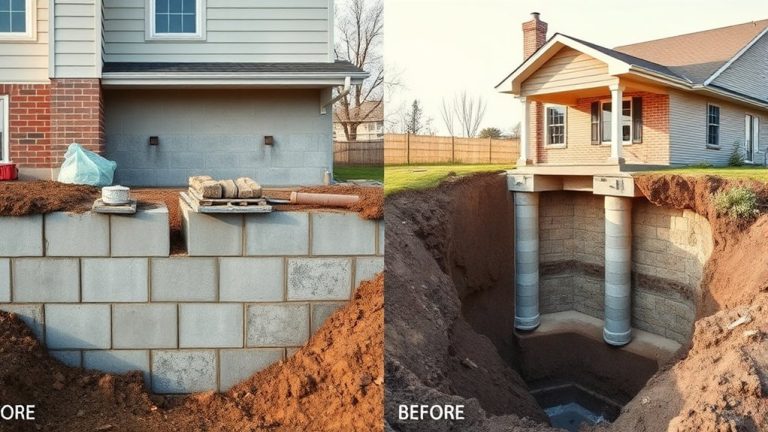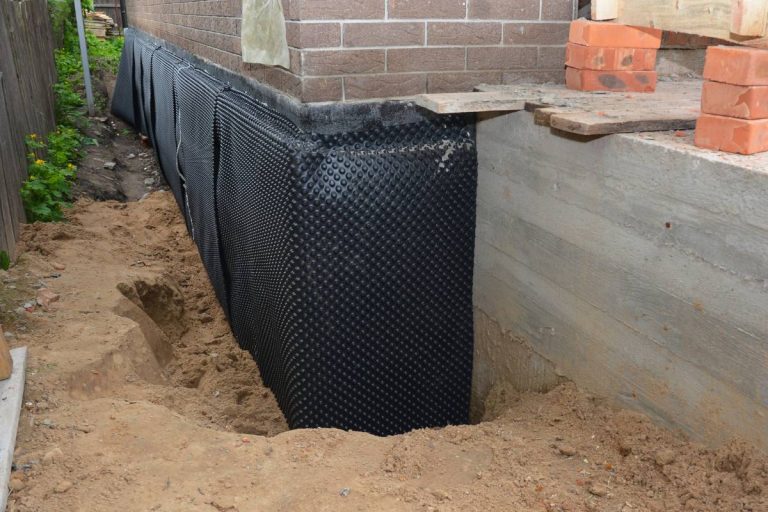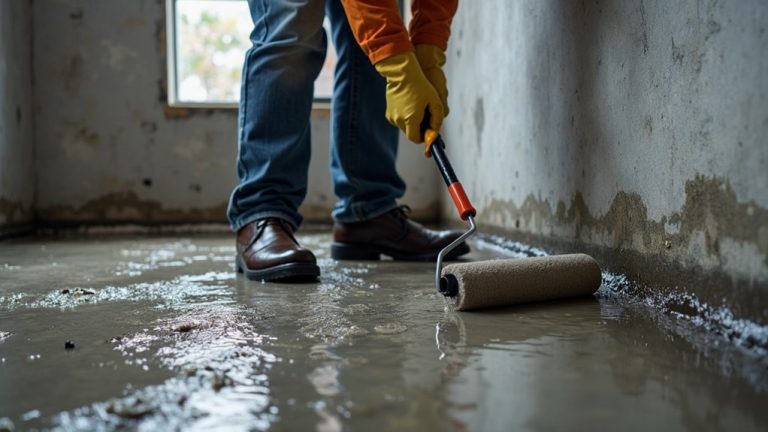Your home’s foundation is its silent guardian, but sometimes it needs help. Cracks, uneven floors, and sticking doors aren’t just cosmetic issues—they’re warning signs of potential structural problems. Ignoring these signals could lead to costly repairs down the road. If you’ve noticed anything unusual about your home’s structure, you might be on the brink of a crucial find that could save you thousands.
Key Takeaways
- Large or widening cracks in foundation walls, exterior surfaces, or interior walls indicate potential structural damage requiring professional evaluation.
- Doors and windows that stick, fail to close properly, or show uneven alignment suggest underlying foundation movement and potential settlement issues.
- Uneven or sloping floors, visible floor cracks near walls, and furniture shifting unexpectedly are warning signs of possible foundation instability.
- Exterior gaps around windows and doors, leaning walls, and visible soil erosion near the home’s foundation can signal serious structural problems.
- Consult a qualified foundation repair contractor who uses advanced diagnostic tools to assess damage severity and recommend targeted repair strategies.
Visible Foundation Cracks: What They Mean
If you’ve noticed cracks in your home’s foundation, you’re not alone. These fissures can reveal critical information about your property’s structural health. Common foundation cracks like horizontal or stair step patterns in mortar joints can be particularly dangerous and require professional assessment. Soil erosion patterns and uneven settling effects often contribute to foundation damage. Hairline cracks might seem minor, but they could signal underlying issues that demand attention. Vertical cracks are typically less serious than horizontal ones, which might indicate significant pressure from soil movement. Don’t ignore these warning signs. Professional inspection can help you understand the extent of potential damage and prevent costly future repairs.
Warning Signs Inside Your Home
How can foundation problems manifest inside your home? Foundation issues aren’t always obvious, but they’ll leave subtle hints throughout your living space. Watch for these critical warning signs:
- Unexplained floor cracks appearing near walls or doorways
- Doors and windows that suddenly stick or won’t close smoothly
- Shifting furniture that seems to move without being touched
These internal signals suggest your home’s foundation might be compromised. Small cracks can indicate serious structural shifts, potentially threatening your property’s stability and value. Foundation repair experts in Syracuse, NY recommend professional assessment to diagnose and address these early warning signs before they escalate into costly structural damage.
Exterior Red Flags to Watch For
Because foundation problems often reveal themselves outside your home first, homeowners should carefully inspect their property’s exterior for telltale signs of structural issues. Look for uneven exterior surfaces that might indicate ground shifting or soil erosion patterns.
Cracks in your home’s exterior walls, especially those wider than a pencil, could signal serious foundation stress. Pay attention to gaps around windows and doors, and watch for leaning or tilting walls. These visual clues can help you catch potential foundation problems early, potentially saving you thousands in repair costs.
Understanding Foundation Damage Severity
When foundation damage strikes, homeowners need to understand the varying levels of severity to make informed repair decisions. Soil settlement issues can create significant challenges, ranging from minor cosmetic concerns to major structural risks.
Mild damage: Hairline cracks, slight uneven floor surfaces
Moderate damage: Wider cracks, noticeable floor sloping
Severe damage: Significant structural shifts, major wall separations
Your home’s foundation health directly impacts its long-term stability and value. Identifying and addressing problems early can save you thousands in potential repairs and preserve your property’s structural integrity.
Professional Assessment and Repair Options
Recognizing the severity of foundation damage marks the first step, but determining the appropriate repair strategy requires professional know-how. You’ll want to hire a qualified contractor recommendation who can thoroughly assess your home’s specific foundation issues.
They’ll conduct exhaustive inspections and propose cost effective repair methods customized to your property’s unique needs. These professionals use advanced diagnostic tools to pinpoint exact problem areas, whether you’re dealing with small cracks or significant structural shifts.
Frequently Asked Questions
How Much Does Foundation Repair Typically Cost Homeowners?
You’ll typically spend $4,000 to $12,000 for foundation repairs, with complex issues costing up to $25,000. Investigate financing options like home equity loans to manage these unexpected expenses.
Can I Prevent Foundation Damage Before It Becomes Serious?
You can prevent foundation damage by identifying early warning signs and taking proactive maintenance steps like monitoring drainage, addressing soil moisture, and scheduling regular professional inspections to catch potential issues before they escalate.
Will Foundation Issues Affect My Home’s Resale Value?
Foundation issues can drastically lower your home’s resale value and curb appeal. You’ll struggle to attract buyers if structural problems are unresolved, potentially reducing your property value by thousands.
How Long Does a Standard Foundation Repair Usually Take?
A foundation repair typically takes 2-3 days, but you’ll want a professional assessment first. The inspection timeline can vary, depending on your home’s specific issues and structural complexity.
Are Foundation Repairs Typically Covered by Homeowners Insurance?
Most homeowners’ policies won’t cover foundation repairs unless the damage results from sudden, specific events. You’ll need a damage assessment to determine if your policy’s limitations exclude or include your specific foundation issue.



